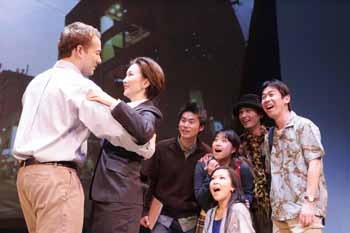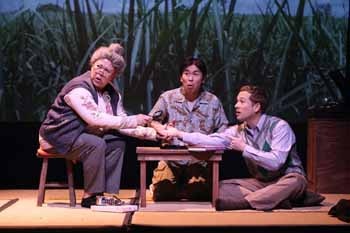My father came to Hawaii from Okinawa in 1907 as an indentured laborer for a sugar plantation company. My mother followed in 1910 as a picture bride and then also became a laborer. When their children began going to school, they both learned to read and write Japanese and English.
They dreamed of one day returning home wealthy, but that day never came. The elusive pot of gold under the rainbow, neither kind nor cruel, was indifferent to them.
In 2005, nearly 100 years later, Jon Hiroshi, their sixth out of eight children, was awarded a Creative Artist Exchange Fellowship from the Japan/US Friendship Commission and the National Endowment for the Arts to study Okinawan immigration to Hawaii. In a way, my father and mother did return home wealthy. Their son represented them as a guest of the Japanese and American governments in Okinawa. The dream they worked so hard for was realized through the children they lovingly raised.
During the six months that my wife, Barbara, and I stayed in Okinawa, I was invited by Professor Katsunori Yamazato of the University of Ryukyus to be a guest lecturer at his American Literature class. Fittingly the book they were studying that semester was a novel of mine, Lucky Come Hawaii.
The students read the American novel and discussed it in Japanese. It was during the question and answer sessions in class that the idea for Voices From Okinawa originated. Millions of American military had come and gone through Okinawa since the invasion in 1945. Yet, the young Okinawans hardly knew Americans and the Americans hardly knew Okinawans. The Americans seemed more interested in the young girls working in mama-san’s bars than meeting Okinawans in schools, churches and homes.
The few students in our class who did know Americans first-hand voiced their opinions about the presence of the American military in their homeland. Some wished the Americans would leave and never return, while others were happy that they could practice speaking English with the GIs.
Realizing that I had a basis for an interesting story, I began assembling their various experiences that ranged from funny, delightful, and thought-provoking, to traumatic and threatening.
The principal character, Kama Hutchins, evolved to become a part Okinawan part-American teacher in a private English school. He encourages his students to talk about themselves, but in English only. The students hesitantly reveal their associations with the American military in their homeland.

The students spy as Kama & Keiko dance the waltz. L to R - Kama (Joseph Kim), Keiko (Sachiko Hayashi), Takeshi (Taishi Mizuno), Namiye (Mari Ueda), Harue (Teruko Kataoka), Hitoshi (Atsushi Hirata), Yasunobu (Kotaro Watanabe)
Keiko Oshiro, a female principal of the school, objects strenuously to Kama’s method of teaching English. She maintains that English is learned by repeating words and sentences over and over, not by making speeches.
Another character is 96 year old Obaa-san, Kama’s recently discovered great aunt, who is a yuta shaman. A warm, gentle and wise lady, she tells Kama about his ancestors. With her powers, she also foresees the destruction of the home and sugarcane field that Kama has inherited from his great grandfather.
In the guise of giving Kama advice, Obaa-san’s ultimate goal is to match him and Keiko. “What Kama should do is to gather Keiko in his arms and kiss her.”
“Okinawan girls like to be kissed?” Kama asks.
“It is the best thing they have learned from Americans,” says Obaa-san.
One of the key storylines to the show is when the American military is about to take over Obaa-san’s canefield property and home. She sings, dances, and prays to her ancestors for guidance. She threatens to tie herself to her bed when the Americans come to burn her home. Her prayers are answered. Kama, her great-grandnephew, says to kick the Army’s butt when they come to take her away. “Butt?” she questions. “Oshiri,” explains one of Kama’s student. “Oh,” says Obaa-san. “Kick ass-u.”
* * * *
Searching for actors to play the various roles was an interesting, but arduous task. I had written the play for Asian-American actors to speak with Japanese accents. Tim Dang, the Producing Artistic Director of East/West Players, informed me that there are hundreds of actors from Japan here in Los Angeles who are all well trained and bilingual. Their accents are authentic.

Obaa-san enters a trance while drinking sake with Yasunobu & Kama. L to R - Obaa-san (Amy Hill), Yasunobu (Kotaro Watanabe), Kama (Joseph Kim)
The response to our advertisements in the trade papers for Asian actors and a part-Asian actor was overwhelming. Over a hundred actors submitted their headshots and resumes; most of them were born and raised in Japan. After cutting the submissions down to 25, we began interviewing them. Those who had been selected at this point were called in to “read” the various roles.
In the end we selected the six actors for the Okinawan roles, all Japanese-born. They were all bilingual with exceptional acting backgrounds. One of the last two roles yet to be filled went to popular TV and movie actress, Amy Hill. She plays charismatic Obaa-san. The last opening went to Joseph Kim, a Korean American actor from the East Coast. His father is Korean, his mother a Caucasian. Having lived in Japan for several years, both Amy and Joseph are familiar with the Japanese language and culture.
After the first rehearsal, Tim and I knew we had made the right choices. The actors not only understood their respective roles, but projected themselves into the characters as though the parts were written specifically for them.
* * * *
As in any play, the playwright must be willing to make changes as the actors and director discover ways to make the play more effective and appealing. I am a Nisei and my Nihongo is not entirely adequate. There are several Japanese words which I had inserted, hoping they were correct. I quickly learned from the Japanese actors that there are better ways of expressing them.
For instance, I wrote, “Arigato gozai masu.” The actor corrected me. It is “Arigato gozai mashita,” she said. Or, for a “Grave,” I wrote, “Haka. I was told the proper word is, “Ohaka.” One of the actors had difficulty pronouncing “Military.” After several attempts, we changed it to, “Army.”
I’m very fortunate to have Tim Dang directing Voices From Okinawa. We have worked together in my other plays which turned out quite successful. Again, he reveals his keen eye for details, his uncanny understanding and insightful perception of the actors’ needs and directions.
The complex moments in the play were easily solved by Tim. The actors, realizing that they are working with a gifted director, are always willing to follow his directions, and give their all to the play.
Tim and I are both from Hawaii. There are moments when we look at each other and know what the other is thinking. No words are necessary. We share the same thoughts, the same goals and the same feeling of warm Aloha. Just as my parents’ dream was fulfilled through their son’s accomplishment, this play is fulfilled by our team’s vision.
* * *
Voices From Okinawa opens at East West Players in Los Angeles, California for Previews between February 7 - 10, 2008. Opening Night is Wednesday, February 13. The Performance runs through March 9, 2008. For more information and to purchase tickets, visit the East West Players Web site at www.EastWestPlayers.org, or call 213.625.7000.
© 2008 Jon Shirota


